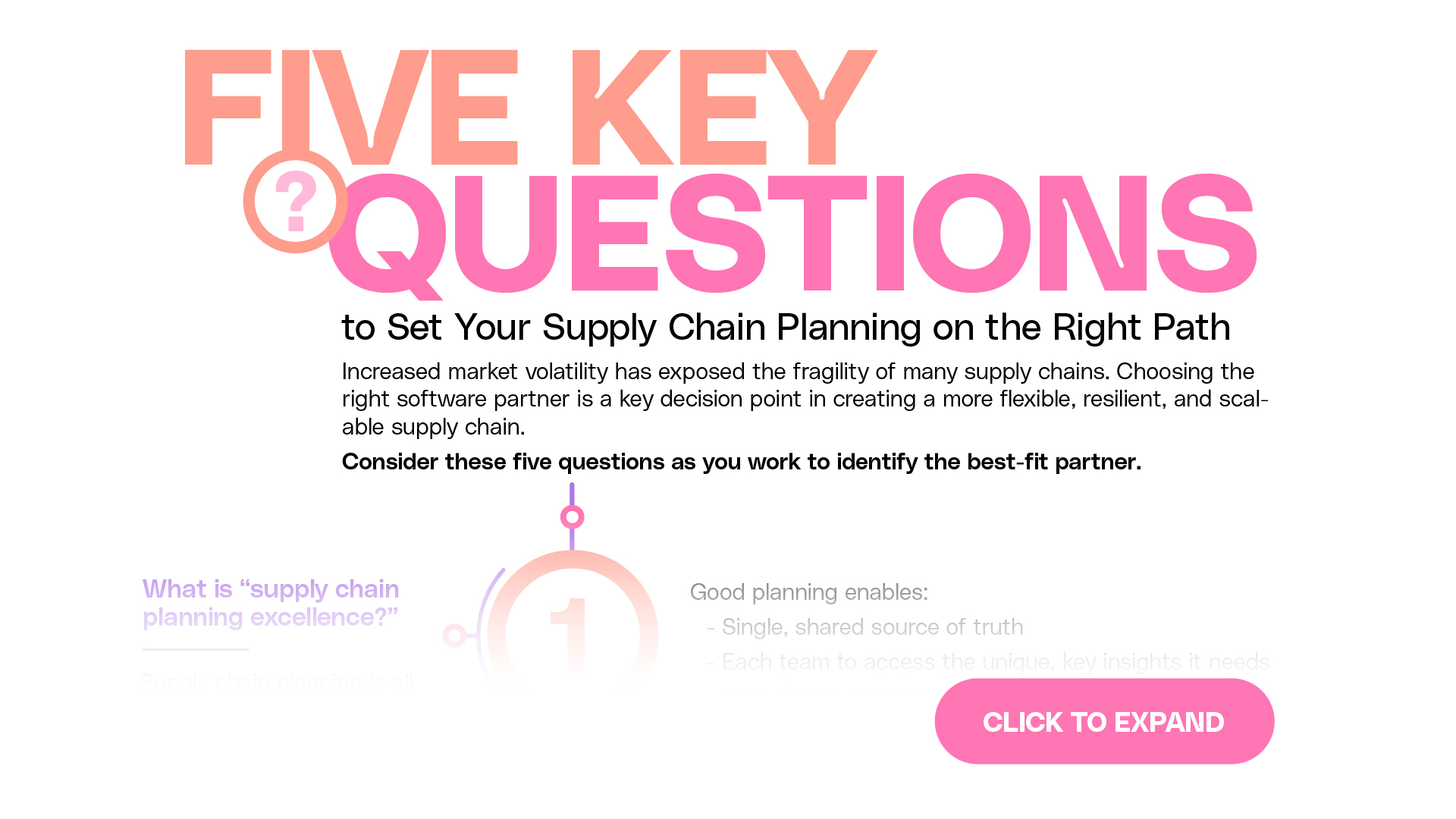The supply chain management software market is very competitive. Companies have a wide variety of solutions and features to choose from to help them manage the many aspects of the supply chain, from forecasting and demand planning to inventory control to transportation logistics.
Because of the breadth of options out there and the complexities inherent in any supply chain, you can feel overwhelmed to find a software provider that does exactly what you need it to do — and does it well.
It goes without saying that your SCM software vendor of choice should be able to draft a practical business case based on your supply chain, key business challenges, needs and dynamics.
Also, there should be a proper fit culturally between your company and the SCM software partner. If you are on the same page during the first weeks or months of getting to know each other, the probability of a sustainable partnership goes up. Every company’s needs are different, of course, but there are five key things all companies should look for when choosing a supply chain management vendor.
1. How configurable is it?
Given the complexities inherent in the modern supply chain, and those within your industry, software that’s highly configurable is crucial. The supply chain needs of a clothing company will differ from a company that sells perishable goods, and therefore, needs to track food temperature and safety requirements throughout the process.
You’ll want to look for the ability to customize views within the software or the option to turn on or off different features entirely, depending on your needs and what issues you’re trying to address.
In addition, the software vendor should be able to make a broad range of additions and changes to the planning environment without writing any custom code. Many vendors can “configure” their software by writing code, but these implementations are difficult to support and expand in the long run. Choose wisely!
2. Is it compatible with your existing tech stack?
It’s not cost-effective nor efficient to purchase a product that can’t work with what you already have. While supply chain management software will likely render a couple of the tools you use obsolete by eliminating redundancies and improving workflows, you’re not replacing your more specialized applications and programs.
You’ll want to look for an SCM solution that can work in concert with the programs you use daily: your ERP system, any CRM system in place (e.g. Salesforce), any BI tools in use (e.g. PowerBI, Tableau, Qlikview), and so on.
3. Is the vendor reliable and knowledgeable?
Choosing an established vendor that understands your business and supply chain needs makes a significant difference when it comes to a company’s success with a specific software solution. Your chosen vendor should be able to offer guidance and expertise that will help you with your business process, and ensure that the initial software configuration supports that process.
Besides that, however, they must be able to provide you with a strong and consistent level of ongoing support. Companies evolve: as your company grows, and your needs change, it’s important to have a vendor that will grow with you.
4. Is it cloud-based or on-premise?
Choosing between a cloud-based or on-premise solution depends on your existing tools, workflows and business needs. Heavily regulated industries with strict requirements for storing sensitive data may require an on-premise solution. Or it may just be that you haven’t fully made the leap to an entirely cloud-based workflow. Cloud-based solutions offer many advantages in terms of staying up to date with the cutting edge of the market, security, and support. It’s no wonder that most businesses now cite cloud capability as a key requirement for new software.
If that’s the case, remember that just because you need an on-premise solution today, it doesn’t mean you shouldn’t think about a cloud-based one for the future.
5. What are its advanced analytics capabilities?
Advanced analytics capabilities that allow you to track activity across your supply chain are a must for a robust SCM solution. Demand forecasts, inventory breakdowns by SKU or by product line, inventory turnover reports, statistics on shipments and customer fulfillment rates, costs, and so on are all extremely important to have at your fingertips.
Therefore, consider the types of reports and data views you need to or want to run and determine whether the SCM solution you’re considering can provide you with all you need to make informed business decisions.
Supply chains are complicated, so there is inevitably a lot you need to take into account when choosing which supply chain management solution is best for your company. Avoid getting overwhelmed by the myriad of considerations, features and options at your disposal by staying focused on your end goal — to increase supply chain efficiency and drive growth — and your company’s specific strategic objectives.
And if you’re looking for a place to start, the Demand Planning experts at John Galt are here to help.
For more information about supply chain management best practices and what steps you need to take when choosing a software vendor to help manage your supply chain, schedule a free consultation with one of our Demand Planning experts today. Our Atlas Planning Platform and ForecastX solutions can help you Walk-Drive-Fly into properly incorporating the best software solutions all along your supply chain.
About John Galt Solutions
More than ever, companies must be able to sense and respond to the dynamics of a complex supply chain. John Galt's Atlas Planning is a unified end-to-end supply chain planning platform that helps you increase forecast accuracy, optimize inventory levels and maximize supply chain performance. Since its founding in 1996, John Galt Solutions has built a proven track record of providing affordable, automated demand and inventory management services for consumer-driven supply chains. We have an unmatched ability to configure tailored solutions for customers, regardless of size, industry, or business challenge, that save both time and money by compressing implementation periods and delivering intelligent information that positively impact your bottom line.
To learn more about John Galt Solutions, contact our press office at 312-701-9026 or visit johngalt.com.




